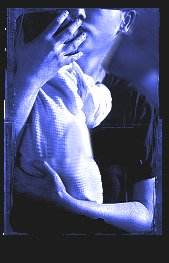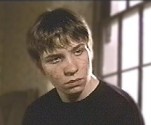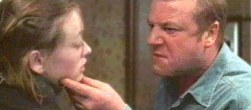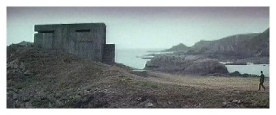|
The War Zone
|
| |
 |
UK,
1999. Unrated. 99 minutes.
Cast: Ray Winstone, Lara Belmont,
Freddie Cunliffe, Tilda Swinton
Writer(s): Alexander Stuart
Music: Simon Boswell
Cinematographer: Seamus McGarvey
Producer(s): Sarah Radclyffe and Dixie Linder
Director: Tim Roth
|
| Grade: A- |
Review by
Jeff Vorndam |
Note: I'm afraid it's impossible to critique this film without discussing
most of the story. This review contains spoilers. As always, if you wish
to experience the movie as a babe left on Mt. Parnassus, read no further.
 his
is not a good date movie. The War Zone leaves such an impact in its wake
that human contact and conversation might feel like an intrusion as you recoil
from the actions onscreen, both seen and implied. Tim Roth, in his directorial
debut, took me to a place I had never been. Though films such as Chinatown,
The Sweet Hereafter, and The Celebration suggest or mention incest,
it is in the background – a seed which has borne pain and anger. In The War
Zone, a cloistered family resides in an environment where the father's sickness
pervades every frame, at first unconsciously, and later graphically. It is to
Roth's credit that The War Zone is neither exploitative nor so intent
on realism that it cannot distance itself from its subject. The distance is
crucial because we are observers in this film. Roth does not tell us what to
think with impressible camera angles and close-ups. His camera is static, and
our eyes are free to take in the grandeur of the wide anamorphic frame. By raising
this story from the intimate gritty level to a more sweeping and artful category,
Roth creates a work that lingers longer and echoes louder.
his
is not a good date movie. The War Zone leaves such an impact in its wake
that human contact and conversation might feel like an intrusion as you recoil
from the actions onscreen, both seen and implied. Tim Roth, in his directorial
debut, took me to a place I had never been. Though films such as Chinatown,
The Sweet Hereafter, and The Celebration suggest or mention incest,
it is in the background – a seed which has borne pain and anger. In The War
Zone, a cloistered family resides in an environment where the father's sickness
pervades every frame, at first unconsciously, and later graphically. It is to
Roth's credit that The War Zone is neither exploitative nor so intent
on realism that it cannot distance itself from its subject. The distance is
crucial because we are observers in this film. Roth does not tell us what to
think with impressible camera angles and close-ups. His camera is static, and
our eyes are free to take in the grandeur of the wide anamorphic frame. By raising
this story from the intimate gritty level to a more sweeping and artful category,
Roth creates a work that lingers longer and echoes louder.
 The
War Zone takes place in the rural and isolated locale of Devon, off the
English coast. It is winter, and the bleak skies provide a dreary inhospitableness
that keeps people indoors. Dad (Ray Winstone) has moved the family out here
from London while he reorganizes his business. The family unit consists of pregnant
Mum (Tilda Swinton), 18-year-old Jessie (Lara Belmont), and 15-year-old Tom
(Freddie Cunliffe), whose nightmare becomes ours as the film progresses. Immediately
we get a sense of Roth's austere style in an early scene that depicts the family
at rest. The camera is set at a medium distance from the actors, showing the
living room with Mum, Jessie, and Tom, silently lounging or reading. This is
a long take, and it eases us into the surroundings so that we begin to notice
the subtle details in body language when Dad enters from outside. The almost
unconscious flinching lets us know that Dad is a force to be reckoned with.
Yet Dad appears to be a reasonably affable guy. He speaks in a kind low voice,
and he's more concerned with work (mumbling on the phone with his back to the
camera and family) than anything else. These first scenes also emphasize the
insularity of this family. Cordoned off in the country, they only receive one
visitor at their home. This exaggerates the impact each family member has on
the others. They dominate each other's lives.
The
War Zone takes place in the rural and isolated locale of Devon, off the
English coast. It is winter, and the bleak skies provide a dreary inhospitableness
that keeps people indoors. Dad (Ray Winstone) has moved the family out here
from London while he reorganizes his business. The family unit consists of pregnant
Mum (Tilda Swinton), 18-year-old Jessie (Lara Belmont), and 15-year-old Tom
(Freddie Cunliffe), whose nightmare becomes ours as the film progresses. Immediately
we get a sense of Roth's austere style in an early scene that depicts the family
at rest. The camera is set at a medium distance from the actors, showing the
living room with Mum, Jessie, and Tom, silently lounging or reading. This is
a long take, and it eases us into the surroundings so that we begin to notice
the subtle details in body language when Dad enters from outside. The almost
unconscious flinching lets us know that Dad is a force to be reckoned with.
Yet Dad appears to be a reasonably affable guy. He speaks in a kind low voice,
and he's more concerned with work (mumbling on the phone with his back to the
camera and family) than anything else. These first scenes also emphasize the
insularity of this family. Cordoned off in the country, they only receive one
visitor at their home. This exaggerates the impact each family member has on
the others. They dominate each other's lives. 
Survival is a theme in The War Zone. When Mum goes into labor, the family
packs into the car and rushes off to the hospital. Along the way, they get in
a violent accident that overturns the car. Miraculously everyone survives, including
the baby, who is born in the wreckage. The characters bear scars, but appear
otherwise unmarked by their trauma. Mum is in postpartum bliss, nursing her
baby before the camera unclothed. Actress Tilda Swinton had just given birth
to twins prior to filming, and her body further enhances the illusion that we
are viewing reality. The blunt indifference to nudity is evident throughout
the film, as shown by nearly every character. This is a family that is not shameful
of their bodies. Yet the heinous acts to follow cast these naturalistic displays
in ambivalent relief. 
Tom's world begins its descent into nightmare when he is arriving home one
day and something catches his eye through the fogged bathroom window. In a medium
distance camera shot of understated brilliance, we learn through Tom's uncomprehending
reaction that something horrible is taking place in the bathroom. Tom finally
pulls himself away from the window, and rather than cutting to a shot revealing
what he has just seen, we stay with Tom as he disconcertingly drops his grocery
bag, a gesture that carries more enormous power than any howl or sob. He realizes
the triviality of his shopping errand in comparison to the world-rocking change
in his family dynamic. He confronts his sister later, and she denies what he
saw, telling him it was not what he thought it was. Since we are not privy to
Tom's viewpoint in that crucial instant, we can only wonder if his mind is playing
tricks on him. Muddying the water further is Tom's inchoate sexual awakening.
The way he looks at his sister, particularly when she is in a state of undress,
suggests that he may be daydreaming, or attributing his own erotic thoughts
of her to his Dad. 
Our doubts are erased eventually in a scene of unflinching brutality. Tom trails
Jessie and Dad to a stone bunker that lurks prominently by a cliff over the
shore. There, he surreptitiously videotapes Dad raping Jessie against her will.
This time Roth does not spare us, and the immobile camera provides no escape
or distraction. The scene is so devastating that its image invades every subsequent
scene and follows you out the theater. It's the exact opposite effect of the
reprehensibly sensational and comic rape near the beginning of The
Messenger: The Story of Joan of Arc. This rape occupies our three-dimensional
world, while the other exists in Luc Besson's cartoon land. When Tom uncovers
further evidence, such as photographs of Jessie and Dad naked together, one
wonders how long he has been raping and molesting her–most likely since before
the move to Devon. And how much does Mum know? When the newborn baby is suddenly
in need of hospitalization, the implications become even more horrifying, and
Tom is spurred to action.
Survival becomes important again in the last act. Tim Roth is concerned with
the effects incest has on its victims and those around them. The ensemble acting
is excellent throughout, but perhaps the most amazing instance is a raw exchange
between the two non-professionals, Freddie Cunliffe and Lara Belmont, as she
implores him to physically abuse her by placing a cigarette lighter to her bare
breast. Her desire to manifest her psychic scars and her mistaken belief in
her complicity are unbearably heartbreaking. Belmont's performance is stunning
and painful. Cunliffe does credit to Tom by underplaying his role and reacting
with a conflicted unsurety the builds to a dramatic breaking point. It's here
that the film stumbles slightly, with a more predictable act of violence that
doesn't deliver the feeling of authenticity we knew in earlier scenes. It's
a movie moment, but it passes. The final shot of the film finds Roth regaining
his poise, with a stark framing of the siblings huddled together alone in the
bunker. It's framed like a painting, and held long enough that the pain and
damage done to these children is apparent to every viewer in the audience. When
the credits begin to roll, you are almost powerless to move.
Unsettling questions remain when the film has drawn to a close. Did Tom act
to save his family or to irrevocably destroy it? Were his accusations to his
sister brought on by disgust or jealousy? And Ray Winstone's Dad, who even to
the bitter end, denies any wrongdoing–is he a monster or simply a sick man?
More than just an in-your-face exposé, The War Zone is a disturbing meditation
on internecine sexual motivation and its day-to-day aftermath.
Review
© January 2000 by AboutFilm.Com and the author.
Images © 1999
Lot 47, Inc.

 The
War Zone takes place in the rural and isolated locale of Devon, off the
English coast. It is winter, and the bleak skies provide a dreary inhospitableness
that keeps people indoors. Dad (Ray Winstone) has moved the family out here
from London while he reorganizes his business. The family unit consists of pregnant
Mum (Tilda Swinton), 18-year-old Jessie (Lara Belmont), and 15-year-old Tom
(Freddie Cunliffe), whose nightmare becomes ours as the film progresses. Immediately
we get a sense of Roth's austere style in an early scene that depicts the family
at rest. The camera is set at a medium distance from the actors, showing the
living room with Mum, Jessie, and Tom, silently lounging or reading. This is
a long take, and it eases us into the surroundings so that we begin to notice
the subtle details in body language when Dad enters from outside. The almost
unconscious flinching lets us know that Dad is a force to be reckoned with.
Yet Dad appears to be a reasonably affable guy. He speaks in a kind low voice,
and he's more concerned with work (mumbling on the phone with his back to the
camera and family) than anything else. These first scenes also emphasize the
insularity of this family. Cordoned off in the country, they only receive one
visitor at their home. This exaggerates the impact each family member has on
the others. They dominate each other's lives.
The
War Zone takes place in the rural and isolated locale of Devon, off the
English coast. It is winter, and the bleak skies provide a dreary inhospitableness
that keeps people indoors. Dad (Ray Winstone) has moved the family out here
from London while he reorganizes his business. The family unit consists of pregnant
Mum (Tilda Swinton), 18-year-old Jessie (Lara Belmont), and 15-year-old Tom
(Freddie Cunliffe), whose nightmare becomes ours as the film progresses. Immediately
we get a sense of Roth's austere style in an early scene that depicts the family
at rest. The camera is set at a medium distance from the actors, showing the
living room with Mum, Jessie, and Tom, silently lounging or reading. This is
a long take, and it eases us into the surroundings so that we begin to notice
the subtle details in body language when Dad enters from outside. The almost
unconscious flinching lets us know that Dad is a force to be reckoned with.
Yet Dad appears to be a reasonably affable guy. He speaks in a kind low voice,
and he's more concerned with work (mumbling on the phone with his back to the
camera and family) than anything else. These first scenes also emphasize the
insularity of this family. Cordoned off in the country, they only receive one
visitor at their home. This exaggerates the impact each family member has on
the others. They dominate each other's lives. 


